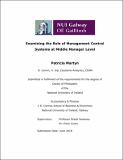| dc.contributor.advisor | Sweeney, Breda | |
| dc.contributor.advisor | Curtis, Emer | |
| dc.contributor.author | Martyn, Patricia | |
| dc.date.accessioned | 2018-10-17T13:48:25Z | |
| dc.date.issued | 2018-10-17 | |
| dc.identifier.uri | http://hdl.handle.net/10379/14616 | |
| dc.description.abstract | This thesis examines the influence of management control systems (MCS) at middle manager level as they drive change while remaining loyal implementors’ of current strategy (Bryant and Stensaker, 2011). It is well recognised that emergent and current strategy is fundamental to firm performance. This study investigates, using the lens of Simons’ levers of control (LOC) framework (Simons, 1994; 1995), how these simultaneous agendas are managed at middle management level.
The starting point of the research is that there has been insufficient attention in the existing MCS literature to middle managers. This is surprising as there is a substantial body of literature in the management domain, which recognises that middle managers are central to explaining key outcomes (Wooldridge, Schmid and Floyd, 2008) and they exert a heavy influence on organisational performance (Currie and Proctor, 2005). In parallel, the MCS literature emphasises the role of MCS in guiding behaviours and managing simultaneous agendas at the senior management or firm level. This study combines these two streams of literature.
A qualitative approach was adopted for this study. Four explanatory case studies were conducted to examine the interconnections between the LOC and middle managers’ strategic influence (Floyd and Wooldridge, 1992; 1997). The case organisations were large, operating in either the med-tech or IT industries. Primary data was gathered through 43 semi-structured interviews, pre-interview surveys and on-site observations.
This study contributes to literature by developing a model to systematise the interrelationships between the LOC and middle managers’ strategic roles. The study extends the applicability of the LOC by advancing our understanding of how it manifests at the middle manager level across firms and functional areas. In addition, the study demonstrates how beliefs systems can be mobilised to manage tensions between multiple logics at middle manager level. | en_IE |
| dc.publisher | NUI Galway | |
| dc.rights | Attribution-NonCommercial-NoDerivs 3.0 Ireland | |
| dc.rights.uri | https://creativecommons.org/licenses/by-nc-nd/3.0/ie/ | |
| dc.subject | Management Control | en_IE |
| dc.subject | Management Control Systems | en_IE |
| dc.subject | Levers of Control | en_IE |
| dc.subject | Middle Management | en_IE |
| dc.subject | Accountancy and Finance | en_IE |
| dc.subject | Business and Economics | en_IE |
| dc.title | Examining management control systems at middle manager level | en_IE |
| dc.type | Thesis | en |
| dc.local.note | This thesis examines how management control systems guide the work of middle managers in contemporary organisations. Middle managers are instrumental to firm performance yet existing research provides a limited account of how management control systems influence their work, this study seeks to address this gap. | en_IE |
| dc.description.embargo | 2022-10-16 | |
| dc.local.final | Yes | en_IE |
| nui.item.downloads | 274 | |


